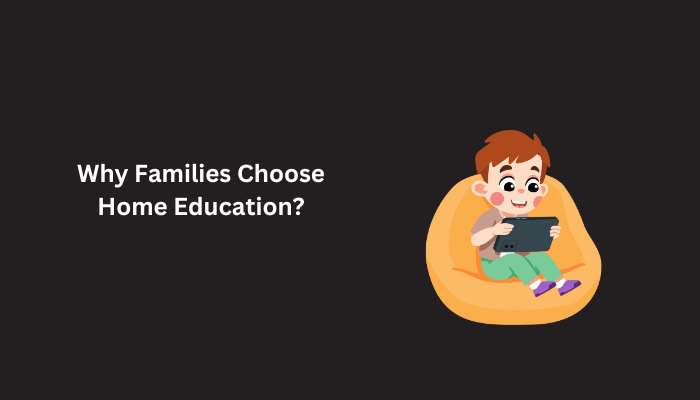If your child is about to reach school-going age, you’re probably knee-deep in researching the best school to send them to.
And if you have stumbled across the term ‘home education’ during the hours spent searching for the right school, you may be wondering, “what is home education?”
We’re here to help shed some light on home education and how it offers a compelling alternative to traditional schooling.
Definition and Description of Home Education
This is also known as homeschooling, refers to the practice of educating children at home rather than in a traditional school setting. This alternative form of education allows parents to tailor their children's learning experience to suit their child’s individual needs, interests, and pace of learning.
It encompasses a variety of approaches, including:
-
Structured curriculum-based instruction at home.
-
Unschooling, where learning is child-led, based on interests, and doesn’t stick to a strict curriculum.
-
Eclectic homeschooling, which combines different educational philosophies and methods.
Regardless of the approach taken, home education empowers parents to take an active role in their children's academic journey, focusing on personalized learning experiences that cater to each child's strengths and weaknesses.
It is a compelling alternative to traditional schooling because of some key differences, which we’ll look at next.
Home Education vs Traditional Schooling
When considering the educational path for children, you may end up having to decide between home education vs traditional schooling. Here are some key factors that may influence your decision:
-
Parent vs Teacher: The biggest difference in both approaches is that in home education, one or both parents take up the responsibility of imparting education to their children. In traditional schooling, this role is fulfilled by qualified educators and teachers.
-
Personalized vs Standardized Education: It provides a personalized learning experience tailored to the individual needs and pace of each child. Whereas, traditional schooling offers large class sizes with a more standardized curriculum, instruction, and assessment method.
-
Flexible vs Fixed Schedules: It allows for flexible scheduling, so children can delve deeper into subjects of interest and progress at their own rhythm. On the other hand, traditional schooling is based on fixed class and holiday schedules, which are convenient for parents to align their work schedules with.
-
Learning Environment: Whatever criticism may be leveled at traditional schooling, they are known as centers for learning, so systems and processes are in place to aid that. With this, parents need to set up the house to create an environment ideal for learning.
These are just a few of the decisions you’ll need to make when choosing between homeschooling and traditional education. But before we dive into how to get started with this education, let’s take a look at how it became so popular in the first place.
The Rise in Popularity of Home Education
With over 40,000 homeschooled students registered in Australia, the number has doubled since 2019. This was probably the result of the convergence of the Internet and the COVID-19 pandemic. What is undeniable though, is that homeschooling is now becoming more popular and is reshaping perceptions of education.
The pandemic served as a catalyst, forcing families to explore alternative schooling options due to lockdowns and safety concerns, leading many to discover the benefits and flexibility that homeschooling provides.
With a plethora of online resources, tools, and educational platforms, parents discovered they could effectively facilitate home-based learning for their children.
As more parents experienced the positive effects of personalized attention, tailored curriculum, and individualized pace that homeschooling offers, the general mindset started shifting in its favor.
Curious to learn more about the reasons that caused this mindset shift? Let’s take a look together, shall we.
Why Families Choose Home Education?

Families chooses this education over traditional schooling for various reasons. It could be based on the child’s needs, the family’s beliefs, financial concerns, or a combination of reasons. Let’s take a look at some of the most common ones:
-
Flexibility: It allows families to customize the curriculum to suit their child's learning style and pace. It also provides the opportunity for more personalized attention and one-on-one instruction, which they believe to be better suited for their child.
-
Enhanced Focus: Without classroom distractions, students can focus better on their studies and make quicker progress in their academic pursuits.
-
Greater Creativity: It encourages creative and critical thinking skills, as well as the exploration of diverse learning resources beyond traditional textbooks.
-
Safety: Some families believe that their home is a safer and more nurturing environment for their children. They may have concerns about bullying, peer pressure, or inadequate resources in traditional schools.
-
Inculcating Values and Beliefs: Some families opt for this education for religious or cultural reasons, wanting to incorporate their values and beliefs into their child's education.
-
Stronger Family Bonds: It fosters closer relationships between parents and children through shared learning experiences and more time spent together.
-
Study of Non-Traditional Subjects: It provides opportunities to pursue and master subjects that may be challenging in a conventional classroom setting. This could include instilling essential life skills, values, and practical knowledge that are often overlooked in mainstream education systems.
-
Child’s Health Considerations: It allows for personalized attention to each child's physical and mental well-being. Whether it be a child with a medical diagnosis that makes traditional learning challenging, or setting up a conducive environment for healthy habits, emotional development, and overall wellness.
-
Improved Academic Performance: Many home educated students excel academically, with higher standardized test scores and college acceptance rates compared to their traditionally schooled peers.
-
Lifelong Learning Skills: It instills a love of learning and self-motivation, preparing students to become independent, self-directed learners throughout their lives.
Whatever the reason, one common theme among families who chose home education for their children is their dissatisfaction with public schools.
Dissatisfaction with Public School
The dissatisfaction with public schools is a driving force behind the increasing trend of parents turning to this education as a viable alternative. The limitations and challenges within traditional public school systems have led many families to embrace this education.
With parents being in charge of curriculum design, they can tailor educational experiences to suit their child's unique learning style, pace, and preferences, leading to a more effective and fulfilling educational journey.
It lets children delve deeper into subjects that spark their curiosity and develop critical thinking skills beyond what standardized education can offer. Not to mention, the one-on-one attention provided in a home setting can nurture a deeper understanding of complex topics and promote academic excellence in ways that may not be achievable in overcrowded classrooms.
It, then, is turning out to be a viable alternative to traditional schooling. But along with the benefits it offers, there are some challenges that need to be surmounted. So let’s examine the disadvantages of home education in the next section.
Challenges of Home Education
While it offers many benefits, there are also some challenges that families may face when choosing this alternative over traditional schooling:
-
Time and Commitment: Parents who opt for home education take on the responsibility of planning lessons, teaching, and overseeing their child's progress, which can be time-consuming and demanding.
-
Socialization: Home educated children may have fewer opportunities to interact with peers, participate in group activities, and develop social skills compared to students in traditional schools.
-
Limited Resources: Homeschooling parents may face challenges in accessing academic resources, extracurricular activities, and advanced coursework that traditional schools offer. However, several online resources are now available to alleviate this issue.
-
Parental Expertise: Not all parents feel equipped to teach certain subjects or may struggle to adapt to different learning styles, which can impact the quality of education provided at home.
-
Isolation: Both children and parents in home education settings may experience feelings of isolation and lack of community support, especially if they do not have access to homeschooling groups or networks.
-
Legal Requirements: Homeschooling families must comply with state regulations regarding curriculum, testing, and record-keeping, which can add complexity and administrative burdens to the home education process.
-
Financial Considerations: It may require investments in teaching materials, resources, and educational tools, which can be costly for some families, especially if one parent needs to forgo full-time employment to homeschool.
-
Balancing Roles: Parents who homeschool must juggle teaching responsibilities with household tasks, work commitments, and personal time, which can lead to feelings of burnout and stress.
-
Transition to Higher Education: Home educated students may encounter challenges when transitioning to college or university, such as meeting admission requirements, obtaining transcripts, and adjusting to a different learning environment. Although, many universities are now offering support to accept homeschooled students.
-
Criticism and Stigma: There is a possibility of criticism or skepticism from family, friends, and colleagues who may question the quality or validity of home education, which can create additional stress and pressure for parents and children.
These challenges may seem huge or they may not hold much water when weighed against the benefits of home education. Only you can decide which is the best approach for your child and your family.
So if you do decide in favor of home education, let’s talk about the steps you’d need to take.
Getting Started with Home Education
If you’re considering starting homeschooling for your children or transitioning from traditional school to this education, it can be a daunting yet rewarding journey.
The first crucial step is to research and understand the legal requirements and regulations regarding homeschooling in your state. The Home School Legal Defense Association (HSLDA) Australia website is a great place to start. By familiarizing yourself with the necessary paperwork, curriculum guidelines, and assessment procedures, you can ensure a smooth start to the homeschooling journey.
Next, it is essential to establish a daily routine that includes dedicated time for academic subjects, creative activities, physical exercise, and breaks. This is essential to establish a daily flow of activities and help your child get into the habit of taking
The home also needs to be set up to create a conducive learning environment with minimal distractions that will help children stay focused and engaged in their studies.
Additionally, you’ll need to explore educational resources such as online learning platforms, educational apps, libraries, and community programs that can enrich the home education experience for both parents and children.
It all may seem overwhelming right now, but the results of home education are undeniable. Yes, it's going to be an uphill climb in the beginning, but once a routine is established, you and your child will definitely start enjoying the journey together.
We, at FunFox, understand your struggles of finding the right educational path for your young ones because we’re parents too.
In fact, that was one of the reasons we started our Writers and Readers Club; to create an ideal learning environment to improve kids’ reading and writing skills. We’d love for you to contact us, so we can figure out how best to support you and your child in your this education journey.
Conclusion
We hope this article has been able to shed some light on this education, its advantages and disadvantages over traditional schooling, and how you can get started with homeschooling.
We understand that this is a decision that’s going to require a lot of thought and reflection. But through proper research, organization, structure, and resource utilization, you can confidently embark on your homeschooling journey with a sense of purpose and conviction.
Don’t worry, you got this!










